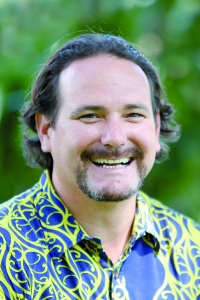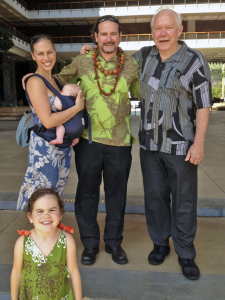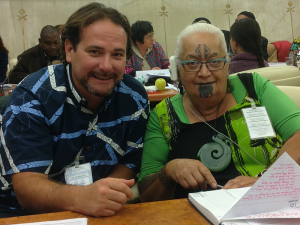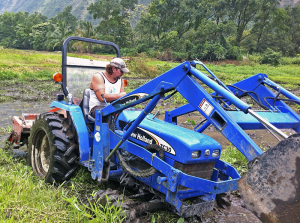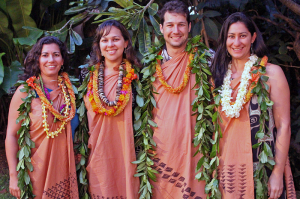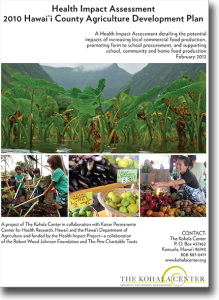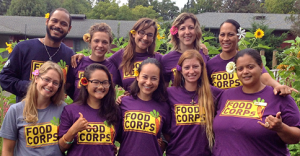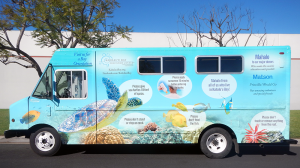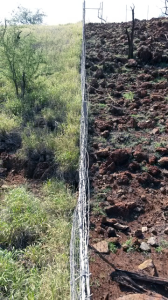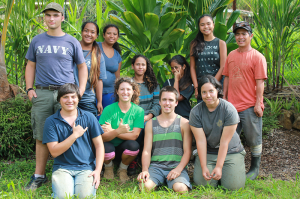“Leadership with aloha” that Hawai‘i deserves
When Dr. Matthews Hamabata—who has served as our president and chief executive officer since our organization was founded in 2000—announced his retirement last year, we faced the daunting task of hiring a successor capable of carrying forward his vision, determination, and exemplary leadership. Members of our staff, board, and network of community partners nominated several outstanding candidates; after a meticulous vetting process, our distinguished search committee enthusiastically selected Dr. Kamanamaikalani Beamer to lead us into the future.
Kamanamaikalani Beamer, Ph.D.
(Photo courtesy Michael Young)
As an independent organization formed in direct response to requests from island residents and leaders to create greater educational and employment opportunities by caring for—and celebrating—Hawai‘i Island’s natural and cultural landscape, The Kohala Center requires bold, effective leadership with a deep understanding of rural Hawai‘i’s value to the world and a drive for excellence in all that we do for the communities and environments we serve. Dr. Beamer—a geographer, historian, author, public servant, former Mellon-Hawai‘i postdoctoral fellow, and farmer—has pushed for excellence and embodied the values of aloha ‘āina (love for the land and natural resources that sustain us) throughout his life and career. The son of Kapono Beamer and grandson of “Auntie Nona” Winona Kapuailohiamanonokalani Desha Beamer, Dr. Beamer brings with him the historical, educational, and musical legacy—and aloha—of Hawai‘i’s Beamer ‘ohana.
Beamer assumes leadership of The Center on March 1 on a part-time basis, moving into the role full-time on July 1. We are fortunate that Dr. Hamabata will continue to collaborate with us on select projects, including the development of our future campus on Kohala Mountain.
“For those who know Kamana, we cannot help but be impressed by his personal integrity, his enormous intelligence, his service to the community, his ability to build bridges, his ease of movement across cultures, his musicality, and his sincere commitment to the values of aloha ‘āina,” Hamabata said. “In our minds, Kamana represents Hawai‘i’s future. We look forward to working toward that bright and promising future under his guidance and leadership.”
Beamer (center) poses with his wife Laua‘e, their children, and father Kapono at the State Capitol following his confirmation to serve on the Hawai‘i Commission of Water Resource Management in 2013
News of Beamer’s appointment had a surprisingly immediate impact: shortly after our mid-January announcement, Beamer was invited to represent The Kohala Center at a global meeting of indigenous peoples convened in Rome by the Food and Agricultural Organization (FAO) of the United Nations. The meeting brought together indigenous community leaders, UN diplomats, FAO directors, nutritionists, and agroecologists to discuss food security challenges and solutions. According to Beamer, “There was a combination of astonishment at the food security issues we face in Hawaiʻi, as well as the solutions-based programs created and administered by The Kohala Center. Our ‘āina-based approach to food security, self-reliance, and community well-being definitely generated much interest and hope among those in attendance. I’m looking forward to building new relationships with communities in the Pacific and around the world facing similar challenges—we have much to share with and learn from each other.”
READ THE REPORT: Indigenous Food Systems, Agroecology and the Voluntary Guidelines on Tenure: A Meeting between Indigenous Peoples and FAO
Naturally, many of our supporters and partners are curious about the impact this change of leadership will have on The Center and those we serve. We sat down with Dr. Beamer and asked him a few questions we hope will help you get to know him better.
The Kohala Center: What is it about The Kohala Center that attracted you to join us?
Dr. Kamanamaikalani Beamer: “The Center’s mission to help people and communities learn from our ʻāina—the land, the natural elements that nurture and nourish us—and respectfully engage Hawaiʻi Island as a model of and for the planet perfectly aligns with my own values and pedagogy. I have long striven to view the ʻāina and our island in this manner in my work as an organizer, an educator, and a farmer. Joining The Center will be a natural extension of my life’s work, in collaboration with a fantastic, passionate, and visionary team that is also committed to changing the course of our world and empowering our island communities to be more self-reliant and independent—all with a spirit of aloha. The opportunity to join The Kohala Center in my new role is amazing, humbling, and completely aligned with my own values and passions. It feels like it has been orchestrated by my kūpuna (respected elders, ancestors).”
TKC: How does The Kohala Center’s work connect with you personally?
KB: “I hope to make Hawai‘i and our island world a better place for my and all of our keiki (children). I wish for all of our island communities to reconnect with their ʻāina and resources, to be more food secure and self-reliant, to have greater opportunities for meaningful work and careers in rural communities. I want keiki in our schools to know what an amazing teacher our ʻāina can be for them; to understand that their heightened awareness of the natural environment and interpersonal relationships as island people is something to invest in and value; and that the world needs them to be who they are, to make themselves better, and to touch and speak for the ‘āina. I want our keiki to have access to healthy food and wholesome futures, because they deserve it. And I want to be a part of a high-functioning, mission-focused team with the courage to envision and achieve a state of pono (balance, harmony) in their relationships to each other, the ʻāina, and the communities around them. I want to continue to set ancestral knowledge and academic research into action.
“These may seem like lofty aspirations, but these are the goals and values that The Kohala Center and I share. I sincerely believe they are all achievable. There is, however, a heightened level of urgency to reach these goals if we are to keep our island communities, lifestyles, and traditions intact while ensuring our natural resources are there for future generations. For me, joining The Kohala Center will enable me to move us closer to these aspirations, and to collaborate with aligned organizations and communities to do what is pono for our islands and for our future.”
Beamer, representing The Kohala Center and Hawai‘i, with Hinewirangi Kohu Morgan, representing Aotearoa (New Zealand) at the Food and Agriculture Organization of the United Nations in Rome, Italy, earlier this month
TKC: What role do you see The Kohala Center playing in Hawai‘i’s future, as well as the future of places beyond Hawai‘i?
KB: “Ten years from now, I envision a thriving, knowledge-based economy here on Hawai‘i Island. The Kohala Center will play a key role as a facilitator to bring ancestral knowledge and academic research together to improve our quality of life and develop greater kinship with our natural resources. I think of ‘aloha ʻāina’ as a movement toward the union of culture and ecosystems. By embracing and deepening our connections to the values of aloha ʻāina, I sincerely believe we can align our lifestyles and social structures with our island ecosystems.
“I also hope to see The Kohala Center build partnerships within our island communities so that Hawai‘i will be recognized as a global voice for the Pacific on issues of sustainability, food systems, biodiversity, agroecology, and indigenous knowledge. It was an incredible honor to be invited to Rome by the FAO and to represent Pacific Island communities at the table alongside indigenous leaders from around the world. It was especially reassuring to hear FAO directors express their interest in supporting indigenous agricultural systems, as well as heritage crops and seeds, in order to make the world more food secure. I believe The Kohala Center’s work positions us well to partner with global organizations like the FAO on these issues. Yet even as we establish global partnerships, we will always be grassroots and serve the aspirations of our local communities.
“This is a critical time in our island planet’s history in terms of achieving greater self-reliance, protecting and preserving our resources and culture, and creating opportunities for our current and future generations to thrive and succeed here at home. We have an outstanding team and a clear mission, and we will continue to strive for excellence in service of our island communities though our ‘āina-based programs.
“These are challenging but really exciting times. I am 37 years old, but the way I see it, I am halfway to 74. That means I need to get a lot of work done before I become a kupuna. I know I will have a greater chance of doing meaningful work with the support and power of The Kohala Center.”
Beamer and his ‘ohana maintain a farm and lo‘i kalo (wetland taro ponds) in Waipi‘o Valley
TKC: What opportunities do you see in establishing a knowledge-based economy in Hawai‘i?
KB: “The Kohala Center’s new campus is going to be an incredible catalyst for nurturing a knowledge-based economy in our communities. I see it as an incubator of inspiration, innovation, and collaboration for our islands. A place where we can continue to serve our mission and our society in a grassroots fashion while bringing farmers, cultural experts, scientists, academics, and leaders together to create a future for our islands. I also see it as an excellent place to continue to foster meeting spaces for ancestral knowledge and science to coalesce and empower us to devise solutions to the world’s problems, bringing together diverse knowledge systems and inspiring regional and global innovation.”
TKC: What does rural Hawai‘i have to offer in terms of contemporary knowledge and ways of living?
KB: “Hawai‘i is comprised of small island communities with big dreams. Our islands have a history of governance and values based on aloha and inclusion. These will be key toward building a better future for Hawai‘i and our communities. Sometimes we underestimate how far our aloha for the ‘āina and for each other have gotten us. Peace, justice, and our natural resources and environments as both our classrooms and our playgrounds. That is what I hope our keiki and their keiki will know and live. That perspective and ethic is what we can share with the world.”
Mellon-Hawai‘i Fellows present their work
In the seven years since we launched the Mellon-Hawai‘i Doctoral and Postdoctoral Fellowship Program, 29 Native Hawaiian scholars have received financial support and mentoring to complete their dissertations or publish their first manuscripts. The two doctoral and two postdoctoral fellows who comprise this year’s cohort recently convened in Keauhou to present their work, discuss academic publishing strategies, and celebrate the successes of their peers.
The 2014–2015 Mellon-Hawai‘i Doctoral and Postdoctoral Fellows: (l-r) Noelani Puniwai, Dr. ‘Ilima Luning, Dr. Noa Kekuewa Lincoln, Liza Keānuenueokalani Williams
The Andrew W. Mellon Foundation and The Kohala Center established the Mellon-Hawaiʻi Doctoral and Postdoctoral Fellowship Program in 2008, with additional support from Kamehameha Schools. The Kahiau Foundation also supported the program in 2010–2011 and 2012–2013. The program recognizes and supports the work of Native Hawaiian academics early in their careers, and others who are committed to the advancement of knowledge about the Hawaiian natural and cultural environment, Hawaiian history, politics, and society. Applications for the 2015–2016 cohort are now being accepted until Tuesday, February 24. More information and application materials are available at MellonHawaii.org/application or by calling Cortney Okumura at 808-887-6411.
Each November, we gather the current year’s fellows, their mentors, academic publishers, and members of our Circle of Friends for a weekend of learning, presentations, and celebration in Keauhou on Hawai‘i Island. This year’s fellows had the opportunity to participate in an interactive discussion about the publishing landscape with editors and publishers from Duke University Press, Kamehameha Schools Press, the University of Hawai‘i Press, and the University of Minnesota Press, covering topics such as communications protocol, submission strategies, and relationship building. The following day the fellows presented updates on their research to an audience of nearly 100 invited guests, addressing several important issues facing contemporary island society. We invite you to view their informative and thought-provoking presentations:
 Postdoctoral Fellow Noa Kekuewa Lincoln, Ph.D.
Postdoctoral Fellow Noa Kekuewa Lincoln, Ph.D.
“Agriculture and Abundance”
Lincoln’s research interests examine combining traditional and modern knowledge of land management to evaluate corporate and policy decisions from a social utility, rather than a purely financial basis.
 Postdoctoral Fellow Rebecca ‘Ilima Luning, Ph.D.
Postdoctoral Fellow Rebecca ‘Ilima Luning, Ph.D.
“Uluwehi nā Pua i ke Kulāiwi: Perspectives from Hawaiian Cultural Practitioners and Classroom Educators on a Modern Hawaiian Ethnotheory of Learning”
Luning’s manuscript seeks to further the understanding of a Hawaiian ethnotheory of learning by examining the cultural goals, values, and purposes of learning in a modern Hawaiian context.
 Doctoral Fellow Noelani P. Puniwai
Doctoral Fellow Noelani P. Puniwai
“‘Ike i ke au nui ke au iki: Assessing Cultural Seascapes in Hawai‘i”
Puniwai’s research evaluates how and why different ocean user groups socially construct and delineate marine space much in the way that coastal areas are ecologically delineated through definitions of functional space.
 Doctoral Fellow Liza Keānuenueokalani Williams
Doctoral Fellow Liza Keānuenueokalani Williams
“Cultural Economies: Image, Intimacies, and the Colonial Landscape(s) of Hawai‘i”
Williams’ dissertation focuses on the ways in which tourism, the military, and the prison industrial complex shape cultural politics for Kānaka Maoli (Native Hawaiians) both historically and in the contemporary moment.
At the end of the weekend, past and present fellows, mentors, and their supporters participated in a celebration that included a ceremonial presentation of kīhei (traditional cloak worn over one shoulder) by members of the Mellon-Hawai‘i program’s senior advisory board, remarks by each of the fellows, and a reception. Addressing those in attendance, postdoctoral fellow Noa Kekuewa Lincoln acknowledged that the program is about much more than financial support. “The additional support we receive through mentorship, through meeting community and intellectual leaders and the past fellows who come back, from The Kohala Center staff, from the publishers willing to share their insights and wisdom with us, and just everyone that this program allows us to interact with is so much more valuable than the financial support. This fellowship program gives us the tools, encouragement, and freedom to explore our own thoughts and grow them…it’s truly a blessing.”
Scholarships offered to summer leadership programs
In an effort to increase educational opportunities for Hawai‘i Island youth, inspire them to pursue academic excellence, and prepare them for the jobs of the future, we offer several full-tuition scholarships each year to high school students to attend educational programs hosted by some of the nation’s top universities. We are currently accepting scholarship applications from qualified Hawai‘i Island high school students for summer leadership programs at Cornell University and Brown University:
 CATALYST and CURIE Academies, Cornell University (July 12–18, 2015)—These one-week summer residential programs are for high school students who excel in math and science. The CATALYST Academy is for rising sophomores, juniors, and seniors (boys and girls), whereas the CURIE Academy is specifically for rising junior and senior girls who may not have had prior opportunities to explore engineering, but want to learn more about the many opportunities in engineering in an interactive atmosphere. Cornell faculty and graduate students lead participants in classes, lab sessions, and project research. Social events, panel discussions, and other out-of-classroom activities provide participants with networking opportunities. Both programs seek to advance diversity in engineering and related disciplines. More information and applications are available online at koha.la/catalyst (CATALYST Academy) and koha.la/curie (CURIE Academy) or by calling The Kohala Center at 808-887-6411. The application deadline for both programs is Friday, February 27.
CATALYST and CURIE Academies, Cornell University (July 12–18, 2015)—These one-week summer residential programs are for high school students who excel in math and science. The CATALYST Academy is for rising sophomores, juniors, and seniors (boys and girls), whereas the CURIE Academy is specifically for rising junior and senior girls who may not have had prior opportunities to explore engineering, but want to learn more about the many opportunities in engineering in an interactive atmosphere. Cornell faculty and graduate students lead participants in classes, lab sessions, and project research. Social events, panel discussions, and other out-of-classroom activities provide participants with networking opportunities. Both programs seek to advance diversity in engineering and related disciplines. More information and applications are available online at koha.la/catalyst (CATALYST Academy) and koha.la/curie (CURIE Academy) or by calling The Kohala Center at 808-887-6411. The application deadline for both programs is Friday, February 27.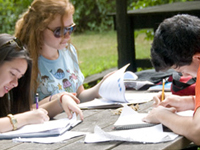 Brown (University) Environmental Leadership Lab–Rhode Island Sustainable Development Program (June 21–July 3, July 5–17, or July 19–31, 2015)—In this program, select high school students from across the United States will live at Brown University’s Haffenreffer Estate, a 372-acre historic farm adjacent to Narragansett Bay. Participants learn how human demands on the environment often compromise the long-term health of the ecosystems that sustain us, and develop the leadership skills needed to tackle pressing environmental problems in their home communities. Students also learn about policies, practices, and emerging technologies that can help reduce humankind’s ecological impact. More information and application materials are available online at koha.la/bell-ri or by calling The Kohala Center at 808-887-6411. The application deadline is Friday, March 27.
Brown (University) Environmental Leadership Lab–Rhode Island Sustainable Development Program (June 21–July 3, July 5–17, or July 19–31, 2015)—In this program, select high school students from across the United States will live at Brown University’s Haffenreffer Estate, a 372-acre historic farm adjacent to Narragansett Bay. Participants learn how human demands on the environment often compromise the long-term health of the ecosystems that sustain us, and develop the leadership skills needed to tackle pressing environmental problems in their home communities. Students also learn about policies, practices, and emerging technologies that can help reduce humankind’s ecological impact. More information and application materials are available online at koha.la/bell-ri or by calling The Kohala Center at 808-887-6411. The application deadline is Friday, March 27.
Health Impact Assessment receives international recognition
The Society of Practitioners of Health Impact Assessment (SOPHIA) recently recognized our 2012 Health Impact Assessment of the Hawai‘i County Agriculture Development Plan as a model in the field. The organization is the only professional society working to promote the use of high-quality assessments to evaluate the possible health impacts of public policy decisions.
Our 2012 Health Impact Assessment (HIA) joins a library of 18 “Model HIAs” selected by SOPHIA. The HIA examined the health impacts of a Hawai‘i County plan to revitalize agriculture on Hawai‘i Island as a path to economic development. The Assessment concluded that implementation of the Plan could strengthen the island’s economy; create jobs; reduce food insecurity; and improve access to affordable produce, in turn reducing the risk of obesity and other chronic diseases
“The Kohala Center’s report is a comprehensive HIA that examines over 20 health outcomes and includes not just physical health, but also social and economic outcomes such as tax revenue and local pride and connectedness, which are often hard to capture,” said Katie Hirono, M.P.H., lead of the SOPHIA Living Library committee and a researcher at the University of New South Wales in Sydney, Australia. “The report includes a detailed and well-done table of the summary of impacts. The report also has a well-thought-out monitoring plan that assigns responsibility and time frames for each indicator.”
Our HIA was made possible by generous grants from the Health Impact Project, a collaboration of the Robert Wood Johnson Foundation and The Pew Charitable Trusts. The Health Impact Project promotes the use of HIAs in the United States to encourage the incorporation of human and environmental health in policy decisions outside of the health sector.
Program news
We turn research and traditional knowledge into action, so that communities in Hawai‘i and around the world can thrive—ecologically, economically, culturally, and socially. We accomplish this through a suite of community-based programs—‘āina-based programs for community well-being. Here we share what our programs have been up to and highlight upcoming opportunities.
-
The 2014–2015 FoodCorps Hawai‘i team
FoodCorps is currently seeking applicants for service member positions for the 2015–2016 school year. This national program places leaders in underserved communities in 16 states and the District of Columbia to connect kids to real food and help them grow up healthy. Our Hawai‘i Island School Garden Network (HISGN) will again serve as the host site for FoodCorps Hawai‘i. Since 2013 HISGN has coordinated 13 service members at eight service sites on Hawai‘i Island, Moloka‘i, and O‘ahu. Check out a webinar about what it’s like to serve in Hawai‘i and find application materials at koha.la/foodcorps. The deadline to apply is March 31.
- This school year HISGN has promoted professional and curriculum development efforts by facilitating workshops in which teachers teach each other. Thirty-five school garden and classroom teachers from across the islands who have participated in HISGN’s Kū ‘Āina Pā teacher training program over the years convened at Māla‘ai: The Culinary Garden of Waimea Middle School on January 31 and February 1 for a weekend of lesson sharing, hands-on learning, and continued relationship building. HISGN has also coordinated a series of free educational events called Teachers Teaching Teachers, led by experienced K-12 educators covering subjects such as how to grow edible heirloom squash, how to plant a Three Sisters Garden, and nutritive cycles and natural farming methods in school gardens. Workshops have also focused on topics related to the Mālama Honua Worldwide Voyage of Hōkūle‘a and Hikianalia such as making teas and condiments for the wa‘a (voyaging canoes) and Hawaiian cordage and fiber making. The knowledge gained in these workshops enables teachers to implement new and engaging curriculum for their students. Learn more about upcoming workshops by downloading the Teachers Teaching Teachers poster.
- As an active and unpredictable lava flow continues to threaten communities in Hawai‘i Island’s Puna district, possibly inhibiting access to population centers and basic services, area residents are increasingly interested in sustainability and self-sufficient living. Lyn Howe, coordinator of our Hawai‘i Public Seed Initiative, presented a “Modern Ahupua‘a” workshop in January on basic seed-saving skills for Puna’s gardeners and farmers. The Initiative is eager to support efforts to develop, save, and share locally adapted seeds and to strengthen seed networks within the district.
- With interest in seed security growing both locally and nationally, the Initiative will host seed leaders from across the islands in mid-February to discuss the feasibility of forming a formal seed co-op in Hawai‘i. A co-op could potentially facilitate a larger-scale seed production and distribution effort in the state; partner with educational, agricultural and conservation organizations to work toward developing varieties well suited for Hawai‘i’s diverse growing environments; and contribute to long-term local food security. For more information about the working group and seed co-op concept, contact HPSI coordinator Lyn Howe at seedproject@kohalacenter.org.
-
The freshly wrapped mobile education unit is ready to cross the Pacific to its new home at Kahalu‘u Bay
The new mobile education unit for our Kahalu‘u Bay Education Center (KBEC) is just weeks away from arriving on Hawai‘i Island. The vehicle—secured with generous support from area businesses, residents, volunteers, and visitors—is a repurposed food truck that has been renovated, undergone some exterior customization, and had a beautiful vehicle wrap installed. After it traverses the Pacific courtesy of Matson, the vehicle will be further customized to build in storage features and a telescoping flat-panel video screen on which to show the center’s educational orientation video. The new mobile education unit will finally arrive at its new home at Kahalu‘u Beach Park this spring, replacing the aging little van that has served as the center’s home since opening in 2011.
- KBEC recently launched Hurdles for Turtles, a joint partnership between KBEC, the National Oceanic and Atmospheric Administration, and Hawai‘i Preparatory Academy. This initiative seeks to increase efforts to protect honu (green sea turtles) by gaining a better understanding of their movements and encounters with people. Twenty-nine turtles have been tagged with microchips and numbers since October, and two turtles were outfitted in late January with satellite tags, which will allow the project team to follow exactly where the turtles are traveling from day to day. Collected data will enable KBEC staff and ReefTeach volunteers to enhance protection of honu through stewardship and environmental education.
Fencing and feral animal control aid in the recovery of vegetation in the Pelekane Bay watershed
- Our Kohala Watershed Partnership team reports some great news: despite several episodes of unusually heavy rain in North Hawai‘i in January, sediment check dams built by the Partnership’s field crew are seeing clean water flowing to and over them. Such episodes provide visible proof that the watershed is healing. This means that years of efforts to restore vegetation upslope to combat soil erosion are working, sparing Pelekane Bay and aquatic ecosystems downstream from damaging soil and silt. The Partnership’s field crew continues to install new fences and repair aging ones all over Kohala Mountain to inhibit feral ungulates such as pigs, goats, and cows from destroying the vegetation vital to holding soil in place and minimizing erosion. While there continues to be a need for sediment check dams to protect the ocean below, the need is now not as urgent thanks to the hard work of KWP’s field crew and hundreds of volunteers over the years.
- Native Hawaiian scholars who are preparing to complete work on their dissertations or have recently received their doctoral degrees are encouraged to apply to our Mellon-Hawai‘i Doctoral and Postdoctoral Fellowship Program. Entering its eighth year, the program supports the work of Native Hawaiian scholars early in their academic careers and others who advance the knowledge of Hawai‘i’s natural and cultural landscape and Hawaiian history, politics, and society. The deadline to apply is Tuesday, February 24. Visit MellonHawaii.org or contact Cortney Okumura at cokumura@kohalacenter.org or 808-887-6411 for more information.
-
Participants in our Fall 2014 High School Agriculture Internship program
Applications are now being accepted for the spring cohort of our High School Agriculture Internship Program. The internships offer paid stipends to Hawai‘i Island high school students interested in learning more about farming, ranching, food production, and sustainability. Interns take field trips to island farms, gain hands-on experience in organic and natural farming methods, and learn more about career opportunities in agriculture. The program runs March 16–20 (during spring intersession) from 8 a.m. to 5 p.m., with each day beginning and ending in Honoka‘a. Space is limited to nine students. For more information and to apply, visit koha.la/farminterns. The application deadline is Wednesday, March 11.
- The Kohala Center is currently conducting a survey of Hawai‘i Island food producers. With investment from the U.S. Economic Development Administration, we’ll be building a commercial kitchen and contract packing facility as part of our new campus on Kohala Mountain Road, and we’re seeking the community’s input on features and amenities that would meet their needs. The survey is available online until March 1 at koha.la/survey-fp or by calling Nicole Milne at 808-987-9210.
- Congratulations to Carolyn Wong of Pa‘ahana Livestock LLC, Howie Simon of Lotus Café, Kahealani Ka‘aihili of Mokuwai Piko Poi Inc., and Kai Bowman of Kamanele Farm, all of whom had their Kiva Zip loan requests funded and subsequently matched by our Hawai‘i Island Food Producers Fund. Kiva Zip enables entrepreneurs to secure no-interest microloans through crowdfunding. With support from the County of Hawai‘i, we created the Hawai‘i Island Food Producers Fund to increase the amount of capital available to island food producers and stimulate local food production. For more information on our microloan programs visit koha.la/loans.


